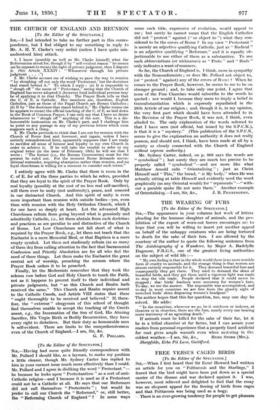[To the Editor of the SPECTATOR.] Sm,—Having had some quite
friendly correspondence with Mr. Pollard I should like, as a layman, to make my position a little clearer, though Mr. Sydney Carter has replied to him in your current issue much more effectively than I could. Mr. Pollard and I agree in disliking the word " Protestant "- he because he looks upon " Protestantism " as a sort of anti- Catholic religion—and I because it is used as if a Protestant could not be a Catholic at all. He says that our Reformers did not call themselves " Protestants " ; but would he prefer to call our Church the " Reformed," or, still better, the -" Reforming Church of England-" ? In some - ways
some such title, expressive of evolution, would appeal to me ; but surely he cannot mean that the English Catholics did not " protest " against (" or object to ") what they con- sidered to be the errors of Rome ? In my view " Protestant " is merely an adjective qualifying Catholic, just as " Radical " is an adjective qualifying " Reformer," and it is equally ob- jectionable to use either of them as a substantive. To use Such abbreviations (or nicknames) as " Prots " and " Rads " only indicates a want of manners.
So far, the Church of England is, I think, more in sympathy with the Nonconformists ; or does Mr. Pollard not object to, (or " protest " against) any of the errors of Rome ? When he comes to the Prayer Book, however, he seems to me to be on
stronger ground ; and, to take only one point, I agree that none of the Free Churches would subsciibe to the words he quoted : nor would I, because they seem to imply a belief in transubstantiation which is expressly repudiated in the
28th Article of our religion ; and, though it is, in my opinion, the very first part which should have been attended to in the Revision of the Prayer Book, it was not, I think, even alluded to. The only eiPlanation of the words referred to that I have seen (not official, but issued by the S.P.C.K.), is that it is a " mystery." (This publication of the S.P.C.K.
seems to give the explanation an authority it does not really possess, and should not, I think, have been made at all by a society so closely connected with the Church of England
without express authority.)
Mr. Sydney Carter, indeed, on p. 903 says the words are " symbolical " ; but surely they are much too precise to be properly called " symbolical "—and are more like what Matthew Arnold calls " Orientalizing " ; just as Christ
Himself said " This," the bread, " is My body," when He was actually sitting at table Himself and evidently used the word graphically (as any Oriental would) for " represents "—" with- out a parable spake He not unto them." Another example of Orientalizing.—I am, Sir, &c., J. B. PENNINGTON.


































 Previous page
Previous page